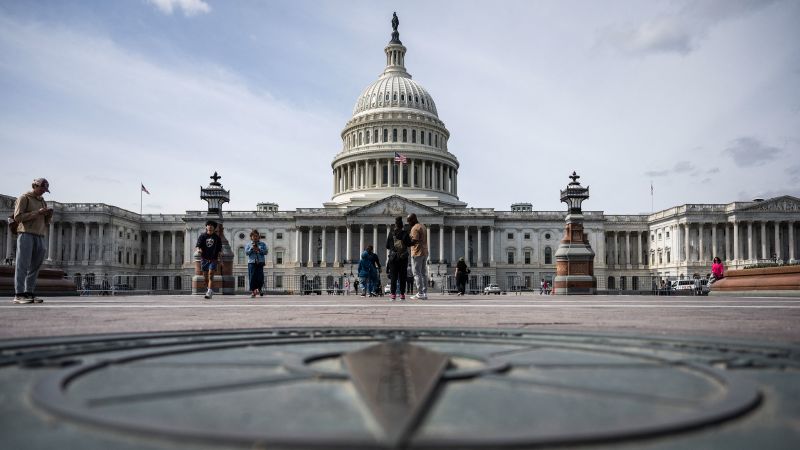Lawmakers unveiled a $1.2 trillion government funding plan Thursday. With the shutdown deadline approaching this weekend, the government is in a high-stakes spurt to pass the bill.
It's not yet clear whether lawmakers will be able to pass the bill before Friday's deadline, and concerns grew on Capitol Hill over the weekend that it could lead to a short-term loss of government funding.
With the publication of over 1,000 pages of legislation; The House and Senate currently face a major time crunch in passing the bill. Many critical government services, including defense, homeland security, labor, health and human services, education, state and legislative branches, must be funded by the end of the day on Friday, March 22nd.
Shortly after the bill was announced, House Speaker Mike Johnson issued a statement saying the bill would “focus the Department of Defense on its core mission and expand support for our brave men and women.” This is a serious effort to strengthen national defense.” uniform. ”
Senate Majority Leader Chuck Schumer said the document would be delivered “on the spur of the moment” with less than 48 hours until the deadline for a partial government shutdown.
“This funding agreement between the White House and Congressional leaders is good news at the last minute,” he said Thursday. “If passed, it would eliminate the threat of a government shutdown for the rest of the fiscal year, avoid the scythe of budget theft, and keep government open without layoffs or poison pills.”
“It's the job of the House Republican leadership to move this policy forward as quickly as possible,” Schumer added.
Leading lawmakers on both sides of the aisle have expressed a desire to avoid a partial shutdown, but there are challenges ahead.
Before the document was released, Prime Minister Boris Johnson said on Wednesday that he was “hopeful” the House of Commons could pass legislation to avoid a budget shortfall by Friday's midnight deadline.
Johnson has so far declined to say whether House Republican leaders will abide by rules designed to give lawmakers 72 hours to consider the text of the bill before voting.
The Louisiana Republican faces a backlash from the right over his handling of the government funding fight, with a razor-thin Republican majority, and will need support from Democrats to get the bill through the chamber. Significant support will be needed.
That bodes badly for Republican leadership. Rep. Robert Aderholt, chairman of the Labor, Health, and Welfare Appropriations Subcommittee, said Thursday he would not support the spending package on the floor, citing concerns about the border and anti-abortion measures.
The Senate needs the consent of all 100 senators to quickly pass a bill, but opposition by even one senator could prevent a quick vote and slow the process.
Schumer warned earlier this week that it would be “tough” to pass the funding package by the deadline.
“As soon as the bill passes the House, I intend to introduce it to the Senate,” Schumer said Wednesday. “It's no secret that it's going to be very difficult to pass these funding bills by the weekend deadline. Therefore, I urge all of my colleagues, Democrats and Republicans, in the House and Senate, to complete the appropriations process. We ask that you remain flexible and prepared to do so.”
The package provides $19.6 billion for Customs and Border Protection, an increase of $3.2 billion from fiscal year 2023, and includes $495 million for additional Border Patrol agents, which the Biden administration has repeatedly requested. There is no additional funding for border wall construction.
The package also provides approximately $90 billion in discretionary funding to the Department of Homeland Security and enhances funding for additional resources. The Republican brief says it funds 41,500 detention beds, more than the previous year and Mr. Biden's request. U.S. Immigration and Customs Enforcement recently developed a plan to reduce detention space and release immigrants as a result of budget shortfalls.
The bill also increases funding for the Department of Defense, providing $824.3 billion, an increase of $26.8 billion over fiscal year 2023.
It will also provide an additional 12,000 special immigrant visas to Afghans who have assisted the United States.
The bill repeals the poison pill that would reduce salaries to $1 for members of the administration, including Secretary of State Antony Blinken, Secretary of Defense Lloyd Austin, and other officials, and programs diversity, equity, and inclusion programs across defense and intelligence. It was intended to block funds for. It involved the community and banned the display of Pride flags.
It also repeals an amendment that would have reduced Head Start funding by $750 million, instead increasing child care and Head Start funding by $1 billion above 2023 funding levels.
The current fiscal year began on October 1, 2023, more than five months ago. Since then, lawmakers have faced a series of fiscal cliffs as a result of funding deadlines created by short-term extensions.
Earlier this month, Agriculture, Commerce, Justice, Veterans Affairs, Energy, Interior, Transportation, Housing, Urban Development, Food and Drug Administration, Military Construction and Other Federal Programs.
Congress is now on the verge of completing its annual spending package if it can pass this latest government funding bill.
Even if there is a temporary shortfall in federal funding, the impact on government operations is likely to be limited if funding is restored by the end of the week.
This story has been updated with additional details.
CNN's Haley Talbot contributed to this report.


